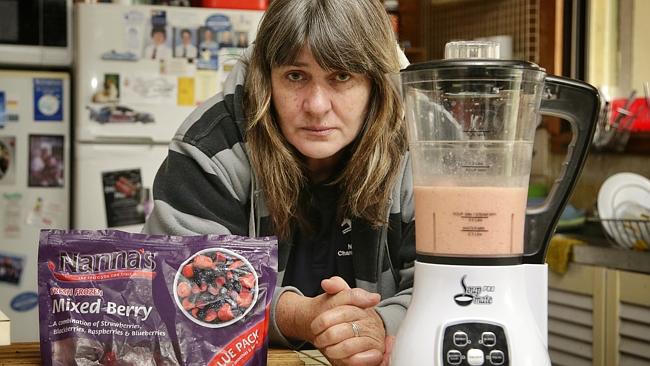Yet another frozen berry product has been recalled as the Nanna’s Hepatitis A scare deepens
- The consumer recall is for:
- Nanna’s Raspberries, 1kg packs, with best before dates until 15/09/16
- Nanna’s Mixed Berries 1kg packs, with best before dates until 22/11/16
- Creative Gourmet Mixed Berries 300g, with best before dates until 10/12/17
- Creative Gourmet Mixed Berries 500g, with best before dates until 06/10/17
FROZEN berries recalled from Australian supermarket shelves were grown and packed in one of China’s most polluted provinces.
Raspberries appear to be a potential common link in the imported fruit contamination that has left 10 Australians diagnosed with hepatitis A.
Five people have now tested positive to the infection in Queensland, along with three from Victoria and two from NSW.

Trudie Sims believes she contracted hepatitis A from frozen berries she consumed in smoothies. Picture: Hamish Blair
The outbreak has led to a national recall of the 1kg packs of Nanna’s Frozen Mixed Berries and packs of 300g and 500g of Creative Gourmet Mixed Berries.
Patties Foods on Tuesday extended the recall to a fourth product to include Nanna’s Raspberries 1kg packs.
Only 5 per cent of fruit and vegetables imported into Australia are subject to any testing — but even those few tests do not check for the bacteria that leads to hepatitis A.
Ten people in Victoria, NSW and Queensland have been diagnosed with hepatitis A after eating the Nanna’s and Creative Gourmet mixed berries.

Fine print on packets of Nanna’s Frozen Mixed Berry packets. Picture: Hamish Blair
Law firm Slater & Gordon said on Tuesday it was looking at a class action after a number of people who had eaten the frozen Chinese berries had contacted them.
Patties Foods managing director and chief executive Steven Chaur on Tuesday apologised to customers for any concern and distress caused.
“While there are no confirmed test results indicating a potential link to hepatitis A, we are working proactively with health authorities based on the information they have presented to date,” Mr Chaur said.
He said the raspberry supplier was no longer used by the company and the recall was a precautionary measure.
“Investigations through our supply chain have identified a specific source of raspberries as a potential common link to the possible safety issues raised by health authorities,” he said.
The development came as a Victorian woman spoke of her scare after eating the frozen berries and learning she may have contracted a mild form of the virus.
Trudie Sims, 49, from Enfield, near Ballarat, became sick after using Nanna’s Frozen Mixed Berries to make smoothies.
She was rushed to Ballarat hospital on Sunday after her partner, Trevor, alerted her to the health warning.
“I just thought I had the flu,” she said. “When my doctor said I had all the symptoms of hepatitis A, I just burst into tears.”
A clinician has told her she may have contracted a mild form of the virus.
Ms Sims said she was “disgusted” that the berries had not been sourced locally.
“We’ve got so many berry farms in Victoria, let alone Australia, so why are we importing these berries from China?” she said.
“I thought I was buying Australian, but I’ll make sure I read the packaging properly in future.’’
Meanwhile, there are fears a number of students at a Victorian school may have been exposed to the virus.
Ballarat Secondary College principal Rick Gervasoni said some of its Year 7 students used the berries in food technology classes last week before the product was recalled.
“Yesterday (Monday), we advised all Year 7 students and sent a letter home to parents which included advice from Victoria’s Chief Health Officer,” Mr Gervasoni said.
The school and parents will monitor the students as they approach the 15-day point at which the disease can become apparent.
Compensation lawyer Mark O’Connor said consumers should ignore advice to throw out any berries they had purchased, because the product could become key evidence should they contract the virus.
He said people should keep them, but mark the packet with the note “poison” so they’re not consumed.
“If they become ill later on, then they will need to be able to prove that they have consumed the product in question and my experience with insurance companies is they won’t take your word for it,” he said.
A Victorian health department spokesman said there would likely be more cases of the virus coming forward as people learned about the symptoms.
“Given the very broad spread of this product, its popularity and its very long shelf life, it’s not unexpected that we will get other cases,” he said.
Berries have been sent to Italy and the US for testing for hepatitis A but the results will not be known for several weeks.
The berries were brought into Australia from Shandong Province, which has a host of pollution problems.
The capital, Jinan, is in the top 10 of China’s smoggiest cities.
Originally published as Anger as berry-linked hep A cases rise
